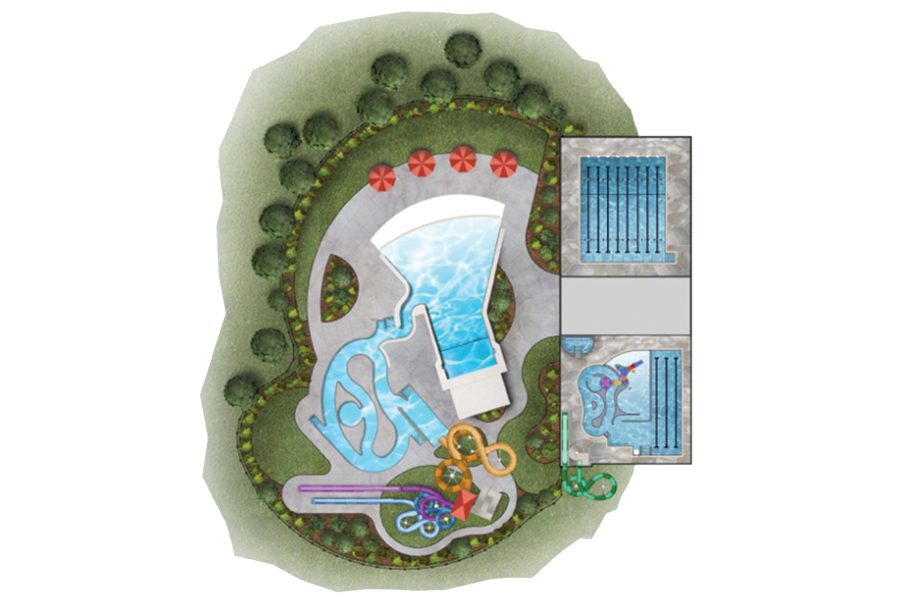
Home » Pasco voters get another shot at aquatics center
Pasco voters get another shot at aquatics center

February 11, 2022
Pasco voters will get a fresh shot at building an aquatics center in April when they’ll be asked to raise the local sales tax by two-tenths of a percent.
The Pasco Public Facilities District is putting the $40 million project on the April 26 ballot, nearly a decade after a similar request was rejected by Tri-City voters and nearly two decades after the city first studied the concept.
If approved, Pasco’s sales tax will go up by 2 cents on a $10 purchase on most but not all sales, with proceeds dedicated to repaying a bond issued to build the center. The location has not been determined – the original site was sold when it looked like the project would not happen. The project will need at least four acres, on a corner.
It likely will be built in western Pasco and will pack a series of family-friendly activities into a single location. Ballard*King & Associates, its Colorado-based design consultant, has created a plan with indoor and outdoor recreations pools, including slides, lazy rivers and a wave pool visitors can walk into.
Other amenities include a concessions area, meeting and party rooms, locker rooms, short-term childcare and support facilities for staff.
A 50-yard, eight-lane competition and lap pool could be added in the future but is not contemplated in the initial phase. Competition pools are expensive to operate and generate little revenue.
The aquatics center will not affect Pasco’s existing Memorial Aquatic Center, 1520 W. Shoshone St., the outdoor pool that operates in the warm months.
Pasco residents have long voiced support for an aquatics center. It is a top priority for the current city council. There is nothing like it in the Tri-Cities, though nearby communities, including Yakima, Moses Lake and Hermiston, Oregon, have developed similar centers.
Pasco voters supported the 2013 regionwide request but were shot down by voters in Kennewick and Columbia.
Some things have changed. The city sold the site at Sandifur Parkway and Midland Lane, north of Interstate 182, to the car dealers. McCurley Subaru and Speck Buick GMC stand there now.
The effort got a fresh start in 2019, then the state Legislature amended the facilities district law – under intense lobbying by the city of Pasco – to include aquatics centers on the list of allowed facilities.
By late 2019, the facilities district was finalizing a plan with the intent to submit it to voters in 2020. The Covid-19 pandemic delayed the request.
By 2021, the district was ready to press ahead, without a confirmed site.
A public facilities district is an independent entity that can raise sales taxes and build such facilities. However, the Pasco PFD relies on the city for funding.
In 2021, the council gave it $60,000 to support planning and acknowledged the district would need another $200,000 in 2022.
In January, the district’s bank balance was in the red. Putting the issue on the ballot will cost nearly $200,000 since it is the only issue – at present – on the April ballot. If the measure fails, it is unclear how it will pay the election bill, a point that concerned several board members. The city’s assurance that it understands the risk gave it the confidence to go on the ballot anyway.
The aquatics center contemplated in 2022 is like its 2013 forbearer in being designed to serve the region, not just the city.
In 2013, Pasco couldn’t afford to build a regional center on its own, hence the request to the entire Tri-Cities.
But its population – and tax base – have grown. It can act alone.
Taxable retail sales were tracking toward $1.8 billion by mid-2021, the most recent figures available. That’s nearly double the $933.3 million recorded in 2013 by the Washington State Department of Revenue. The more taxable sales, the more tax revenue to draw on.
Pasco Mayor Pro-Tem Craig Maloney, a longtime champion of building an aquatics center, has asked the district to discount rates for city residents if they agree to tax sales within the city to build it.
The outcome of the April election has political consequences for the entire Tri-Cities because of how public facilities districts are allowed to levy taxes.
If Pasco voters agree to the two-tenths sales tax hike, it will eliminate the ability of the Tri-Cities Regional Public Facilities District to raise local taxes, essentially putting it out of business.
The Kennewick and Richland PFDs would still be free to seek voter approval to raise sales taxes since the Pasco tax wouldn’t apply in their respective jurisdictions.
There is no guarantee voters will go along with any proposal.
Kennewick and Richland voters have previously rejected public facilities requests. There was the 2013 aquatics center vote promoted by the regional entity that failed in both cities.
Later, the Kennewick district asked its voters to expand the Three Rivers Convention Center – in 2016 and again in 2017. Voters said no both times. Richland has not submitted a project to its voters.
The Pasco facilities district will form committees to identify the pros and cons of the plan at its February meeting.
Real Estate & Construction Local News
KEYWORDS february 2022





